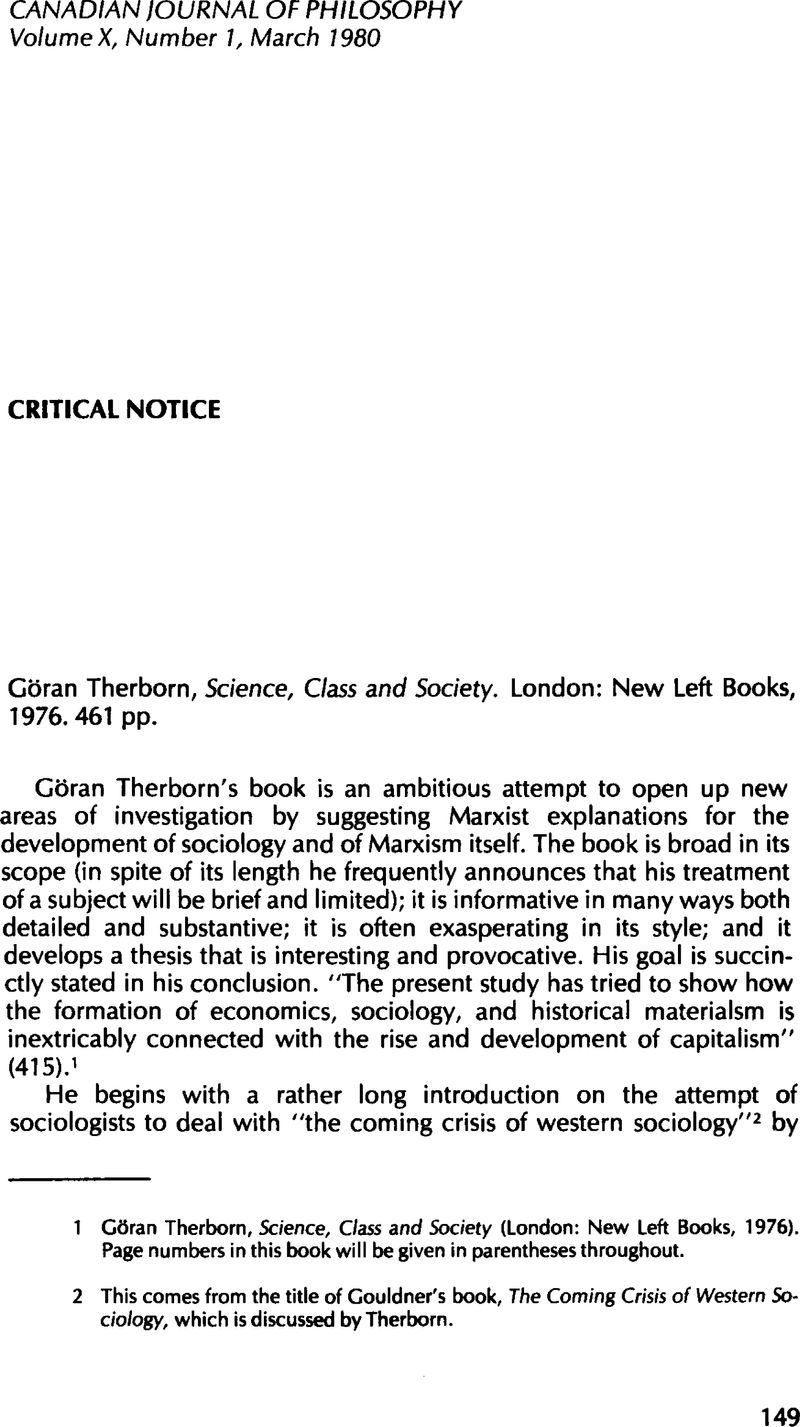No CrossRef data available.
Article contents
Göran Therborn Science, Class and Society. London: New left Books, 1976. 461 pp.
Review products
Published online by Cambridge University Press: 01 January 2020
Abstract

- Type
- Critical Notice
- Information
- Copyright
- Copyright © The Authors 1980
References
1 Therborn, Göran Science, Class and Society (London: New Left Books, 1976).Google Scholar Page numbers in this book will be given in parentheses throughout.
2 This comes from the title of Gouldner's book, The Coming Crisis of Western Sociology, which is discussed by Therborn.
3 There is an interesting discussion of this point by Fodor, J.A. in his Psychological Explanation (New York: Random House, 1968).Google Scholar
4 This is closer to Althusser's charracterization of a problematic, for which see Althusser, L. For Marx (New York: Vintage Books, 1970), p. 66Google Scholar (“On the Young Marx“).
5 He speaks of discourses of science, as though each science were presented in a different set of statements (“all the potential thoughts“) like a separate language game. He then alludes to a problem of articulation, which is discussed below.
6 A similar view is found in Bertell OIlman's preface to the second edition of his Alienation (Cambridge: Cambridge University Press). The preface is published as “In Defence of Internal Relations” in Radical Philosophy 13 1976), pp. 18-23. There he says “Marx calls our attention to the reciprocal effect between all the elements of his value theory and their common function as expressions of a particular historical period, capitalism” (p. 20).
7 Althusser, “On the Young Marx”, p. 68.
8 Oilman does try to say why, but I find his arguments unconvincing. For example, he thinks we cannot understand Marx's claim “value is labor,” but I do not see how it is anymore difficult to understand that than the claim “people are lovers.” I have also indicated how changes of classifications can be accounted for without a doctrine of internal relations or of things as relations.
9 Marx, Karl “Wage Labour and Capital”, section Ill in Tucker, R.C. ed., The Marx-Engels Reader (New York: W. W. Norton ' Co., 1972), p. 177.Google Scholar
10 Marx, Karl Grundrisse (Harmondsworth: Penguin, 1973), p. 687.Google Scholar
11 Marx, Karl Poverty of Philosophy (New York: International Publishers, 1971), p. 154.Google Scholar
12 Marx, Karl The Economic and Philosophic Manuscripts of 1844 (New York: International Publishers, 1971), p. 100.Google Scholar
13 Marx, “Wage Labour and Capital”, section IV, in Tucker, ed., The Marx-Engels Reader, p. 182 (emphasis in the original). Perhaps there is more evidence that I have missed in the book mentioned by Therborn: Vygodsky, V.S. Die Geschichteeiner grossen Entdeckung (Berlin: Verlag die Wirtschaft, 1967).Google Scholar
14 Althusser, For Marx, p. 227. If there was such a radical break, one would expect this to have been noted by Marx himself. One contention is that Marx did indicate the break when he wrote in his famous preface about settling accounts “with our erstwhile philosophical conscience”. (Cf. Althusser, For Marx, p. 165n.) I do not think that Marx's comments there can support this contention.
15 John McMurtry cites some examples of people who have claimed that Marxism cannot depend on a theory of human nature. See McMurtry, John The Structure of Marx's World View (Princeton, New Jersey: Princeton Univ. Press, 1978), pp. 16–17.Google Scholar See also pages 19-53 for a discussion of Marx's theory of human nature.
16 Richard Schmitt, “Alienation and Class”, Radical Philosopher's Newsjournal (Spring, 1978), p. 1. (The notions of human essence and of what it is to be a complete human being are different, although both appear to be under attack by Schmitt.) In the same issue, similar attacks are made by Roger Gottlieb (p. 13) and Karsten Struhl (p. 23).
17 This is discussed at the beginning of the chapter on the labour process. See Marx, Karl Capital, vol. 1 (London: Lawrence and Wishart, 1970), pp. 173f.Google Scholar
18 Ibid., p. 309, in the chapter titled “Co-operation”.
19 Ibid., p. 571n, in the section titled “The So-Called Labour-Fund”. This passage, and the topic as a whole, is discussed by Lichtman, Richard in “Marx and Freud, Part Three: Marx's Theory of Human Nature”, Socialist Revolution, 36 1977), pp. 37–78.Google Scholar The issue is also discussed in interesting ways by Oilman in Alienation, Part II, “Marx's Conception of Human Nature”.
20 Marx, Grundrisse, p. 85.
21 For a discussion of essence and appearance in the thought of Marx, see G. A. Cohen, “Karl Marx and the Withering Away of Social Science”, Philosophyand Public Affairs, 1972), pp. 182·203.
22 Althusser, Louis Essays in Self-Criticism (London: New Left Books, 1976), p. 63.Google Scholar
23 Ibid., p. 47. A place where Marx suggests such a view is in his Theories of SurplusValue, Part I (Moscow: Progress, 1969), p. 44, where he speaks of “forms arising from the natural necessity of production itself, forms that are independent of anyone's will or of politics, etc.“
24 Articulation is also discussed at 108 and 113.
25 Marx, Karl and Engels, Friedrich Collected Works, val. 5 (New York: International Publishers, 1976), p. 37.Google Scholar
26 Marx, Karl Capital, val. Ill (New York: International Publishers, 1970), p. 232 (chapter xiv).Google Scholar
27 As quoted by Sohn-Rethel, A. in Walton, P. and Hall, S. eds., Situating Marx (London: Human Context Books, no date), p. 63.Google Scholar
28 Lenin, V. I. “The Three Sources and Three Component Parts of Marxism” as in V. I. Lenin: Selected Works (One Volume Edition) (New York: International Publishers, 1971), p. 20.Google Scholar
29 Ibid., p. 24.


